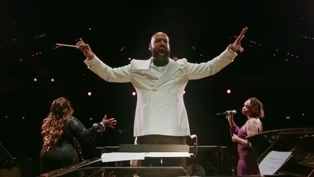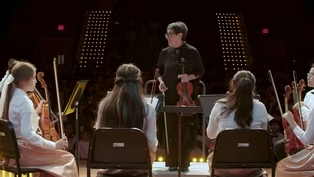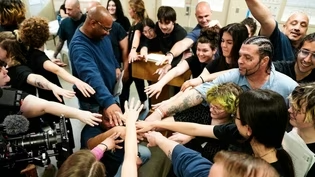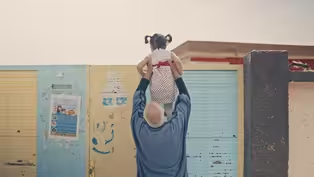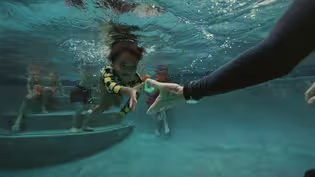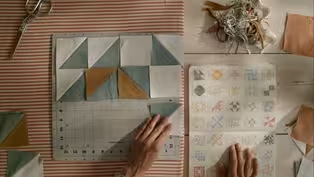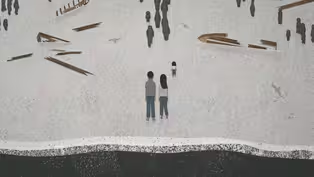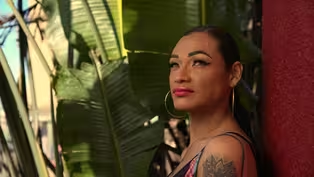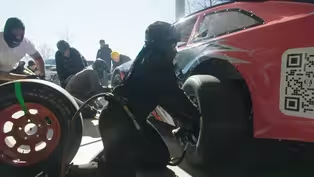
POV Shorts: Water Work
Season 36 Episode 602 | 23m 26sVideo has Audio Description
Memory and resiliency through Detroit and Canarsie’s unique relationships to water.
Two stories exploring themes of memory, devastation, and resiliency through Detroit and Canarsie’s unique relationships to water.
See all videos with Audio DescriptionADProblems playing video? | Closed Captioning Feedback
Problems playing video? | Closed Captioning Feedback
Major funding for POV is provided by PBS, The John D. and Catherine T. MacArthur Foundation, the Wyncote Foundation, Reva & David Logan Foundation, the Open Society Foundations and the...

POV Shorts: Water Work
Season 36 Episode 602 | 23m 26sVideo has Audio Description
Two stories exploring themes of memory, devastation, and resiliency through Detroit and Canarsie’s unique relationships to water.
See all videos with Audio DescriptionADProblems playing video? | Closed Captioning Feedback
How to Watch POV
POV is available to stream on pbs.org and the free PBS App, available on iPhone, Apple TV, Android TV, Android smartphones, Amazon Fire TV, Amazon Fire Tablet, Roku, Samsung Smart TV, and Vizio.
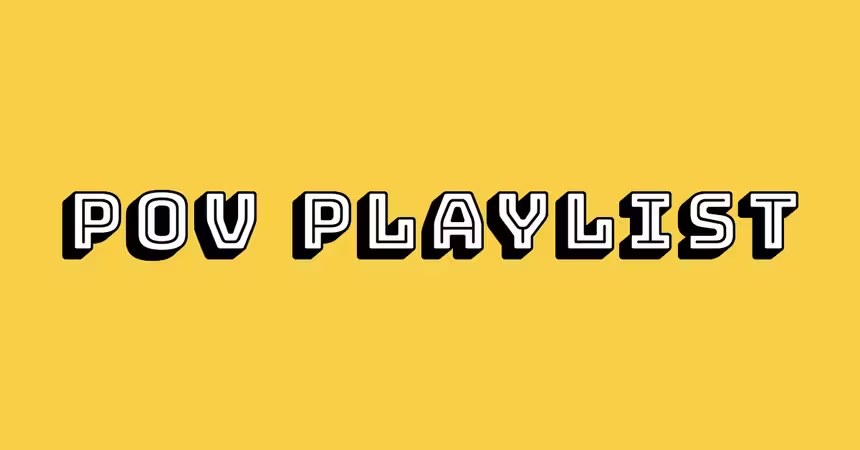
POV Playlist
Every two weeks, we curate a selection of POV docs, old and new, around a central theme. Stream while you can — until the next Playlist!Providing Support for PBS.org
Learn Moreabout PBS online sponsorshipMore from This Collection
The best and boldest independent short films, curated by America's longest-running documentary
POV Shorts: Songs of Black Folk
Video has Closed Captions
Leading Black musicians in the Pacific Northwest create new traditions on Juneteenth. (26m 55s)
Video has Closed Captions
A retired music teacher starts Georgia’s first youth orchestra for immigrant families. (22m 5s)
Video has Closed Captions
A history professor teaches a class of free and incarcerated students inside a prison. (38m 2s)
Video has Closed Captions
From big city to small town, two stories reflecting contemporary America. (25m 5s)
POV Shorts: The People Could Fly
Video has Closed Captions
A poetic look at roller rinks as sanctuaries for Black culture, joy, and resistance. (21m 48s)
Video has Closed Captions
Photographer James Balog brings the 15-year Extreme Ice Survey project to a close. (25m 5s)
Video has Audio Description
Ahmed must find a way to get his son’s remains back home to Morocco so he can say goodbye. (40m 19s)
Video has Audio Description
Kids learn to swim - and, in their lessons, we discover profound wisdom for all. (21m 9s)
Video has Audio Description
Two stories of quilted heirlooms and generational nostalgia. (24m 35s)
Video has Audio Description
Families traverse tradition and memory in marking new phases of life. (25m 5s)
Video has Audio Description
A portrait of the experiences unique to displaced queer people fleeing violence at home. (25m 5s)
Video has Audio Description
Two stories of women who trailblaze and persist. (24m 50s)
Providing Support for PBS.org
Learn Moreabout PBS online sponsorship♪♪ ♪♪ [ Water lapping gently ] ♪♪ ♪♪ -I think all of our lives, there are opportunities for stillness.
Sometimes they're forced upon us.
♪♪ For many reasons, life will tell you to sit down, but for the most part, we're encouraged to keep moving.
♪♪ ♪♪ My grandmother used to live downtown.
♪♪ Whenever we came down, she would insist that we go on walks, and one of the walks that we would always take was down to Hart Plaza.
♪♪ And I just remember being at the river and looking out at Windsor and her, you know, telling me that water never stops moving.
And how profound that was to me, you know?
♪♪ You know, this idea of, like, constant motion.
♪♪ Whenever I come home, one of the first things I do is go to Belle Isle.
You know, I just do a lap around the isle.
It doesn't matter what season it is.
It could be the dead of winter or it could be a crowded summer day.
But that's like a real grounding for me, you know?
When I was growing up and when my daddy would come get me on the weekends, we would do a lap around Belle Isle in his '98.
He always knew somebody in the park.
It was always some family having a barbecue.
And even if he just knew one person, that was reason enough to, like, crash [chuckles] the barbecue.
The giant slide towers in my memory.
♪♪ First of all, me being super brave... [ Laughs ] ...surfing down there.
It was when I discovered that I was fearless.
♪♪ [ Water lapping gently ] ♪♪ ♪♪ And I was born in the Black Bottom.
When my family first came up from Alabama, they landed in the Black Bottom.
♪♪ ♪♪ [ Women vocalizing ] There's this one beautiful picture of three or four generations of that side of my family on Belle Isle.
They went to Belle Isle, this place that had been so sacred to me my entire life, way before I saw this picture.
I'm probably connected to my egún, to my ancestors... through them having walked through this space.
And even if this space is something different, you know, now... it's still this space where they once were.
♪♪ ♪♪ When I look at the east side in particular, and I know how many people and families and literal homes are missing... Like, I remember driving through my old hood on Eastlawn at Charlevoix and Vernor and just crying... because none of the houses were there.
And it probably looks a lot like Alabama.
It probably looks like where my people came from, you know, quite frankly, on both sides.
My mother's from Indiana.
It looks like... something incredibly rural.
♪♪ [ Water lapping gently ] ♪♪ The flooding eats your memories.
It destroys them.
It literally, you know, takes your old photographs, your prom dress, your father's boots.
♪♪ ♪♪ When I think about flooding, I think about... you know, how when water is still.
Flooding is literally like water being trapped and having nowhere to go.
♪♪ Sometimes we don't even have not just the energy, but the means to, like, deal with flooding.
♪♪ I think about what's about to happen to this whole region.
I think about individual's basement and what it means every spring to have to, like, go down there and bail out your basement every year and try to repair that damage and then have some resilience against the way that it eats your house, the foundation of your house.
And so then what we do consequently with memories and with... just love thoughts really is we -- we store them in a place, and... sometimes we pull them out to tend to them, you know?
But for the most part, we have to keep moving because life is constantly in motion and it's constantly changing.
I try not to judge the changes, you know?
I like to welcome them, but I also sometimes bemoan them like I'm mournful of the things that are past.
♪♪ ♪♪ So much of what's important about Detroit is the blackness of it, you know?
And as we lose that, just how much gets buried, whether it's when freeways are created or when we just necessarily have to move forward and things just get, you know, stored away maybe to be looked at some other time.
But it could also be that they just end up, you know, being... eaten up by the water, by the mold, by the neglect.
I don't have anything profound to say about erasure.
It's just this sinking feeling of, like, cities that may or may not have existed, you know, whether it was Atlantis or some city of gold.
Will we exist moving forward?
And if not, will these memories and these stories persist in a thousand years?
[ Water lapping gently ] ♪♪ Like most people, I have an existential dread when it comes to thinking about climate.
I think about what it would look like if Detroit suddenly became home to a bunch of climate refugees, if Michigan is a safe place... and we had all the fresh water.
♪♪ ♪♪ ♪♪ ♪♪ ♪♪ [ Music fades ] O0 C1 [ Water lapping ] ♪♪ ♪♪ [ Train cars rumbling ] ♪♪ ♪♪ -This is a Ro ckaway Parkway-bound L Train.
The next and last stop is Canarsie Rockaway Parkway.
[ Train door dings ] [ Seagulls calling ] -This is the last stop on this train.
Everyone please leave the train.
Thank you for riding with the MTA NYC Transit.
[ Beeping ] -♪ You are not alone ♪ ♪ You are not alone ♪ [ Cars honking ] -So we want to get the ferry to come to Canarsie.
And the meeting is about as to why we're not getting it at this time.
-Okay.
-Okay?
May I offer you a flier, miss?
-They ain't bringing no damn ferry over here.
-Flier?
-No, thank you.
-For the L train being out?
For the ferry?
-Well, we would hope that, um, it happens during that time.
But if it doesn't happen this year, we're certainly hoping it's going to happen sometime.
-In my pocket.
-Thank you.
-Yeah, they overlooked us and went to Far Rockaway.
-Yeah.
-When is this?
-The 24th.
-I will be there.
Thanks.
-You're welcome.
-Okay.
-Yeah, we need the ferry.
-Need it!
-Thank you.
-I've been going to the meetings!
I went to the councilwoman, they said Amazon was coming.
Amazon ain't coming there no more.
-Ah, which one is nicer?
Let's go over here.
Ah, look how nice and serene this is.
So beautiful.
[ Seagull calling ] ♪♪ ♪♪ ♪♪ ♪♪ -Yeah, whoo!
[ Clapping ] -Pull toward the right side, right side!
Make it go out towards John.
-Pull the water, yeah, side to side!
-Is that how it usually works?
-Well, you push yourselves in, but we're being nice to you today.
-Thank you.
-We don't push you in.
-Okay.
-Okay.
I'm not out there stroking for ya!
You gotta paddle together, together, left, right.
Two people in a boat is a riot.
Together, people!
♪♪ You go out on that water and nothing... nothing bothers you anymore.
Because you become at peace with yourself and the water.
And you just... it's just tranquil and there's nothing like it.
[ Seagulls calling ] -This was our home.
This was our quiet place.
You just see and hear the birds and the wildlife.
Which is really... a unique place to live in Brooklyn.
But if you get these people coming in here through the ferry, a lot of people now is going to be looking at our community with dollar signs.
They will take away our privacy.
♪♪ I'm very proud of where I live and I want to...
I want to keep it like this.
I want to maintain it.
And I tell everybody I'm not going anywhere.
So make it your business, this is my business.
[ Fishing bells ring ] -All done.
-[ Indistinct ] -Clams, squid, shrimp, chicken, hot dogs.
People never thought about using hot dogs, but they bite on hot dogs too!
That's the bait.
Fish is fish, you know?
The fish going to do what they want to do, and you got to be here to either catch them or not.
People come here from all over... Staten Island, Howard Beach, Far Rockaway.
That's the main thing I like about it.
You meet different people, you know?
You meet a lot of friends.
-You gotta play with it, make it go like this.
-No.
-For real.
-No.
-[ Laughs ] -Gotta play with it, baby.
-Sometimes let it lay every now and again, too.
-That's how you teach people how to fish?
-Me, personally, I have better luck on the incoming tide.
Some people will see a place like Canarsie Pier and they'll instantly think, you know, the water is so horrible.
A lot of people, they don't know that the fish in New York, yeah, it's high in, like, metals like mercury and stuff like that.
But the same fish that a lot of people would catch, like, in a boat... it's the same fish that you'd catch here.
-When the fish are here... they're plentiful.
Porgies, striped bass, bluefish.
You can catch anything you want here.
And it's good fish.
You can go home and eat it.
The water dictates everything.
If the temperature of this water... gets above 60 to 65 degrees, all kinds of fish are here.
-Every now and then you get new people.
When they come here, you show them how to fish this pier because the tide moves so fast and so strong.
If you're using the wrong weights, you tell them, "Look.
That ain't going to work over here.
It's too light."
As soon as you throw it in [whistles] it's gone or it's going this way.
Either way.
All these guys, I've known them for 25 years, almost 30 years.
I've been fishing here with them ever since I was a kid.
But this pier, as far as the atmosphere of it, it's the same, you know?
[ Water lapping gently ] -What's now New York City was made up of a variety of small villages.
One of which was Canarsee.
The Canarsee were some of the first people to be in contact with the Dutch when they first arrived.
Obviously the face of New York City has changed significantly and what was land that had many streams that were used as routes, avenues... those are gone.
We still use the waters for transportation and commerce.
And for native people, including centuries ago the Canarsee, it had a spiritual value.
The indigenous people here, the Canarsee, the Lenape, the Munsee, the Minisink, understood the value of what the waterways provide to them.
Using traditional knowledge, these ways were used to strike an ecological balance.
There have been some that said... "Better watch out.
Climate change may cause the seas to continue to rise, and you're going to find places...
underwater."
♪♪ The waters have swallowed up civilizations in the past, and there's no reason to believe that it couldn't happen again.
♪♪ [ Train cars clattering ] -I don't think people know the extent of the damage of the L train, and that's the only train that comes into Canarsie.
And I don't think people knew or still don't know how we had to rebuild this community.
♪♪ -Sandy hit.
After Sandy, most people realized that we was underserved.
-So, um...
I'm not sure if everyone can read this, but this is what... -I can't see the display.
[ Crowd murmurs indistinctly ] -Excuse me!
You're part of a New York City agency, right?
-That's correct.
-So you know that the L train is going out of service?
Was that taken into consideration when you did your study?
-One of the reasons why you decided against Canarsie, it was a seven-minute difference.
-It wasn't meaningfully faster.
-No, no, no.
I'm still within my sentence.
-Sorry.
-Parking for the pier.
We need this ferry in this community.
I'd love to take my kids on it and go on the water and enjoy our beautiful waterways.
As you know, we need that here.
We are at a disadvantage in this community.
There's no reason why we should not have been considered over Coney Island.
They have more accessibility to direct transportation than we do.
[ Cheers and applause ] -That's right!
♪♪ ♪♪ [ Indistinct conversations ] [ Seagull calling ] -Mommy, I'm doing it!
[ Children laughing ] -Three, two, one.
-So it's like duh, duh-duh?
[ Clapping and stomping ] Okay.
[ Clapping and stomping ] [ Laughing ] -Imagine what it would be like there was a ferry over here.
♪♪ [ Water lapping ] ♪♪ ♪♪ [ Train cars clacking ] ♪♪ ♪♪ ♪♪ ♪♪ ♪♪ ♪♪ ♪♪ ♪♪ ♪♪ ♪♪ ♪♪
Support for PBS provided by:
Major funding for POV is provided by PBS, The John D. and Catherine T. MacArthur Foundation, the Wyncote Foundation, Reva & David Logan Foundation, the Open Society Foundations and the...
